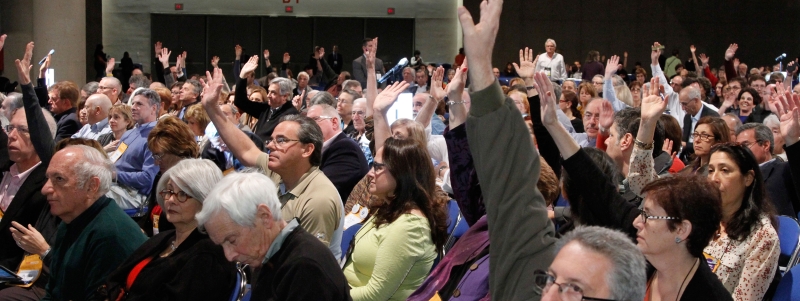Background
The Agreement on Robinson’s Arch: Soon after the Barak government was elected, the Conservative movement in Israel entered into negotiations to designate Robinson’s Arch as an official alternative to the Western Wall area for Conservative prayer services. The North American Reform movement felt particularly strongly that while historically Robinson’s Arch is an extension of the Western Wall, it is not THE KOTEL as commonly understood by the authorities (the government, the rabbinate and the courts) and the vast preponderance of the world’s Jews. We felt that to engage in discussions with the government, the purpose of which were to produce an arrangement to pray at Robinson’s Arch, would dilute our central insistence that the Kotel is the inheritance of the entire Jewish people and is not an ultra-Orthodox synagogue. We felt that no amount of rationalization or explanation would persuade world Jewry that Robinson’s Arch is the Kotel.
Hence, we declined to join the Conservative movement in its discussions with the government. After all, anyone can enter the Robinson’s Arch area now. No one needs special government approval. And we were not excited by the idea that the non-Orthodox movements would be "allowed" to worship way down in a deep excavation, while the main body of Jews, governed by the ultra-Orthodox authorities, would pray up in the Plaza area. There is nothing wrong with that on an informal basis, but to officially agree to this arrangement as part of a formal settlement, struck us, frankly, as offensive.
Women of the Wall: How coincidental that the Supreme Court ruled on the very next day that it too does not buy the argument that Robinson’s Arch is the Kotel. "The women have the right to pray according to their custom in the open space in front of the Western Wall," wrote the Court, in rejecting the government’s contention that the Robinson’s Arch area could serve as an alternative for the Women of the Wall. The Court ruled in favor of the Women of the Wall and gave the government six months to devise adequate administrative and security arrangements.
It is important to remember that, despite efforts on the part of ultra-Orthodox propagandists to portray them as Reform, the Women of the Wall are a mix of Reform, Conservative and Orthodox women. In their petition they did not seek to challenge the exclusive ultra-Orthodox jurisdiction at the Wall. They said simply that in the women’s section women should be entitled to pray as a group with kippot and tallitot, and be allowed to read from the Torah.
The service is not egalitarian as no men are allowed in the women’s section. This decision is not complete from our perspective since the principle of equality is not upheld. Our view is that the government should be able to accommodate both Orthodox and non-Orthodox worship modes at the Wall. This can be accomplished in a number of ways, for instance, setting aside a designated period in the week for Orthodox and non-Orthodox prayer, or setting aside parts of the Wall for Orthodox and non-Orthodox worship.
The Court’s decision, however, challenges the notion that the Kotel is an ultra-Orthodox synagogue, and this is the root of all of the problems at the Wall. Anything that chips away at this notion serves the best interests of the non-Orthodox movements and, indeed, the entire Jewish people.
A week after the Supreme Court’s ground-breaking decision the Knesset’s ultra-Orthodox forces submitted two bills to circumvent the Court’s ruling. The Knesset’s passage of both these bills in preliminary readings shocked and dismayed us.
One, entitled "Safeguarding the Western Wall" introduced by the ultra-Orthodox United Torah Judaism party and passed by 33 to 26, imposes a seven-year prison sentence and monetary fine for women who wear prayer shawls, read from the Torah, blow a shofar, or lay tefillin at the Western Wall.
The other, entitled " Safeguarding the Holiness of the Western Wall and the Plaza" submitted by Shas and passed by 29 to 26, declares that one must behave at the Kotel and the surrounding plaza as if in a synagogue. It prohibits various types of activities including, wearing immodest clothing, holding public gatherings without prior permission from the representatives of the Chief Rabbis, eating, drinking, smoking, photographing for a fee and slaughtering animals.
To use the parliament of Israel-- the highest sovereign body of the Jewish people-- to overturn a Supreme Court decision and render the Kotel an ultra-Orthodox synagogue where women are not allowed to pray freely violates the fundamental principles of tolerance, democracy and civil rights. It, furthermore, threatens the heart of Jewish unity and peoplehood.
Now therefore, be it
RESOLVED, that the Union of American Hebrew Congregations Board of Trustees warmly commends the Women of the Wall for its courageous and principled struggle to be allowed to pray at the Western Wall;
RESOLVED, any legislation which attempts to overturn the Supreme Court’s "Women of the Wall" decision and render the Kotel an Orthodox synagogue threatens the fundamental unity of the Jewish people and the very essence of Israel’s democratic character;
RESOLVED, that the UAHC expresses its outrage at the preliminary passage of the two aforementioned bills by the Kneset and urges in the strongest possible terms the ultimate defeat of these and similar pieces of proposed legislation;
RESOLVED, that the UAHC urge Reform congregations to express solidarity with the Women of the Wall in appropriate ways.
Give to the URJ
The Union for Reform Judaism leads the largest and most diverse Jewish movement in North America.
